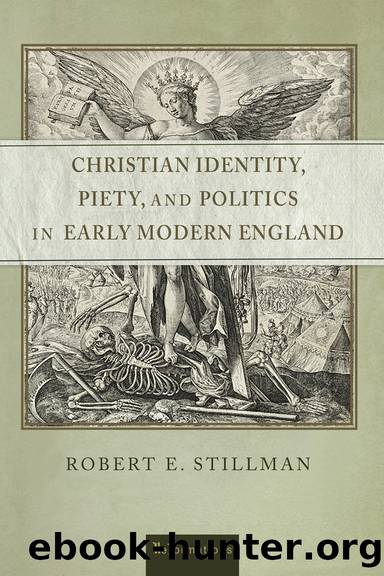Christian Identity, Piety, and Politics in Early Modern England by Robert E. Stillman;

Author:Robert E. Stillman; [Stillman;, Robert E.]
Language: eng
Format: epub
ISBN: 9780268200411
Publisher: LightningSource
Published: 2021-07-02T00:00:00+00:00
READING IN THE MIXED MODE: MINGLING GENERIC AND RELIGIOUS KINDS IN ASTROPHIL AND STELLA
If it is true that no history of early modern rhetoric is intelligible that fails to include an account of classical rhetoric as it was reformed by Christians, Catholic and Protestant, Erasmus to Melanchthon, then it follows that the same semantic history that recuperates new scope for Sidneyâs fascination with oikonomia and energeia has implications for how we read his poetry. The same claim exists for the history of poetics as it was reformed from the brilliant neo-Aristotelian, onetime Jesuit Giovanni Antonio Viperano to that studious, broadly Protestant gentleman from Kent William Scott.71 Put more plainly, keeping an eye on Sidneyâs concern for his Maker has real power to illuminate his fiction making, both in regard to the pious argumentations of the revised Arcadiaâs saintly Pamela and in regard to that all too obviously fallen Astrophil.
Astrophil is the spectacularly unsaintly protagonist of a sonnet sequence whose mixing of generic kinds exemplifiesâas Rosalie Colie anticipatesâthe power of the genera mista to provoke second-order reflection: thinking about competing âsetsâ or perspectives on experience. Astrophil and Stella provokes such thinking as a consequence of its own distinctive engagement with what William Kennedy has called Petrarchan âuniversalism,â that mode of writing lyric poetry that came close to establishing a norm for poetic making in sixteenth-century Europe. Stubbornly English and internationally aware, recognizably courtly even as he disdains the court, artlessly sincere in his romance posturing and artfully conscious of his audience of courtly readers, Sidneyâs Astrophil challenges the universalism of the Petrarchan in every act of domesticating it to the vernacularâand, by doing so, makes himself utterly characteristic of sonnet writers (imaginary and real) everywhere in Europe. Astrophilâs quest for distinctiveness is the repetition of a repetition. Such encounters between vernacular poets and their Petrarchan original âdisplay a palimpsest of social change, cultural adjustment, and political development,â writes Kennedy, and they display too (I will argue in regard to Sidneyâs sequence) a similarly deep inscription of religious transformations.72 In response to the crisis of confessionalism, Astrophil and Stella domesticates to the English vernacular a cosmopolitan Christianity with claims to a universality all its own.
Exemplary as an instance of its genre, Astrophilâs sonnets multiply from one into many, single lyrics into a sustained narrative, as his romance ambitions for satisfaction eventuate in tragic frustration. Sonnet by sonnet, the sequence puts to the test of individual experience those large claims of Petrarchan poetry (and the still larger claims of Petrarchâs Neoplatonic commentators) about the potential for spiritual ennoblement in romantic loveâand accounts such claims, by the sequenceâs dreary finale, utterly bankrupt. Such claims are weighed in relation to experienceâdesireâs motions intruding into every verbal actâand such claims are adjudicated in the courtroom of ultimate resort, the one where the maker provokes reflection about the Maker.73 There is nothing simple about the judgments rendered, or about the process of making them. Understanding Astrophil means locating him between the competing generic claims of romance and tragedy, with their distinctive âsetsâ upon experience.
Download
This site does not store any files on its server. We only index and link to content provided by other sites. Please contact the content providers to delete copyright contents if any and email us, we'll remove relevant links or contents immediately.
4 3 2 1: A Novel by Paul Auster(11788)
The handmaid's tale by Margaret Atwood(7447)
Giovanni's Room by James Baldwin(6808)
Asking the Right Questions: A Guide to Critical Thinking by M. Neil Browne & Stuart M. Keeley(5355)
Big Magic: Creative Living Beyond Fear by Elizabeth Gilbert(5351)
Ego Is the Enemy by Ryan Holiday(4954)
On Writing A Memoir of the Craft by Stephen King(4661)
The Body: A Guide for Occupants by Bill Bryson(4580)
Ken Follett - World without end by Ken Follett(4442)
Bluets by Maggie Nelson(4259)
Adulting by Kelly Williams Brown(4231)
Eat That Frog! by Brian Tracy(4147)
Guilty Pleasures by Laurell K Hamilton(4116)
White Noise - A Novel by Don DeLillo(3829)
The Poetry of Pablo Neruda by Pablo Neruda(3813)
Fingerprints of the Gods by Graham Hancock(3731)
Alive: The Story of the Andes Survivors by Piers Paul Read(3728)
The Book of Joy by Dalai Lama(3694)
The Bookshop by Penelope Fitzgerald(3616)
